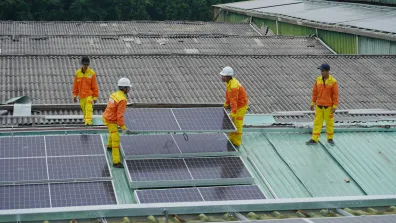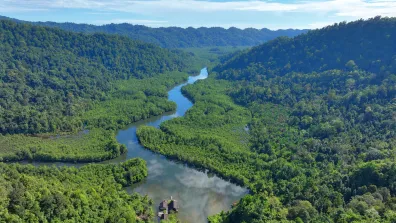Paying up for climate collapse
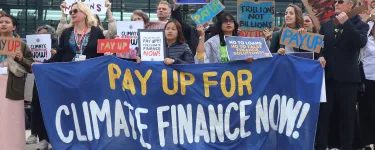
For centuries, people, animals, and the environment — whole ecosystems, predominantly across the Global South — have been treated as resources to be extracted, exploited, and consumed for huge profit, by and for the benefit of a wealthy minority in the Global North. This has destabilised relationships between humanity and the natural world. It has caused the climate crisis.
Meanwhile, our economic, political and social structures are failing most of the global population, pushing us towards social and ecological collapse.
But, enough is enough. It’s time for rich Global North countries and multinational corporations to be held accountable for their roles in causing the climate crisis – by producing the most carbon emissions historically – while continuing to grow rich from their polluting industries. They must pay up for the climate crisis.
Global North governments must urgently redirect money away from fossil fuel subsidies, from deadly and destructive conflicts, and from the super-rich via fair taxation – to support Global South countries to deal with unfolding climate collapse, and to pay for a just transition to greener, fairer economies and societies.1
No climate justice without human rights
Climate breakdown is increasing inequality, contributing to greater political instability, and fuelling devastating and deadly conflicts, especially over resources and minerals. 2 In the Democratic Republic of the Congo 3, minerals essential to the green energy transition, such as cobalt and coltan used in lithium batteries, are deeply implicated in the current conflict. Conflicts rage over the control and extraction of these minerals. 4.
Militaries are also among the biggest emitters of greenhouse gases.5
Meanwhile, Israel’s ongoing, plausible genocide against the Palestinian people – as stated by the International Court of Justice – has killed over 34,000 Palestinians, including 14,000 children, and injured almost 80,000. Research group Forensic Architecture, which examines state violence, has additionally identified Israel’s actions as ‘ecocide’– the mass damage and destruction of nature..6
The systematic violations of international law that Israel is committing against Palestinians, with the complicity of countries that continue to trade arms with Israel, including the UK, would not have been possible without the support and supplies of fossil fuel giants. 7
In October 2023, just days after invading the Gaza Strip, Israel moved to sell the rights to gas drilling off the coast of Gaza8, highlighting the connectedness of militarised, violent regimes and polluting industries – and how this is driving climate collapse.
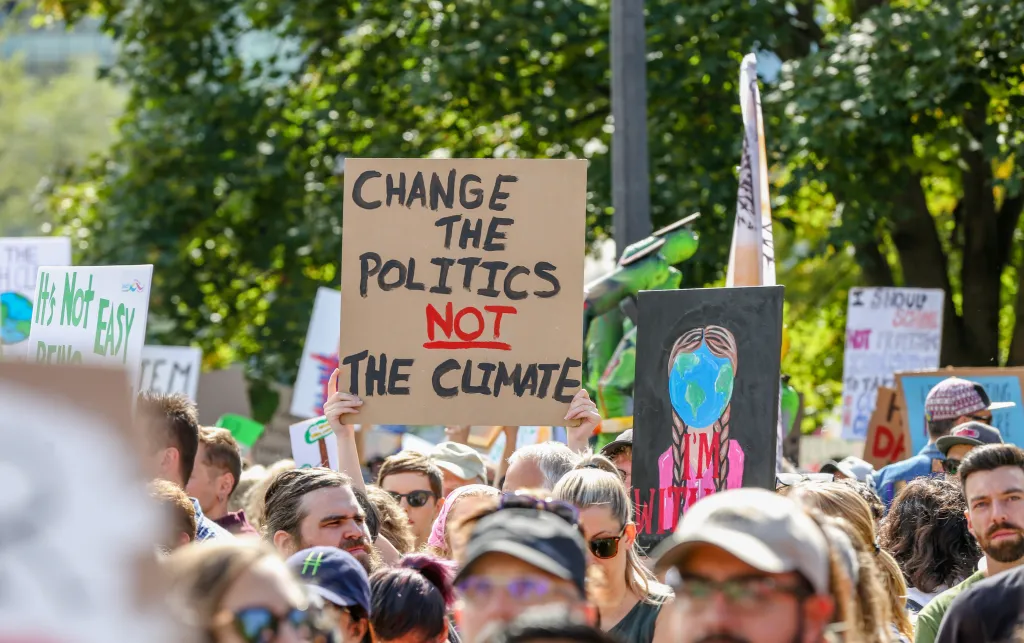
Time for a Global Green New Deal
It's clear therefore, that our economic, social and political structures aren't just inadequate — they are destructive by design, based in centuries of colonialism, extraction of people and resources, of profit at any cost. But there's hope. We can address the climate crisis, inequality and political instability by tackling their interconnected causes and by centring justice, equity and harmony with the natural world in our solutions.
Our vision of a Global Green New Deal (GGND) is a solution to climate collapse and political instability, by restructuring the global economy away from exploitation, towards care and repair. We are calling for a rapid, fair and equitable transition to renewable energy, for global trade and tax rules to be reformed, for our food systems to be transformed, and for universal access to essential public services like healthcare, education, and housing.
But who pays, and how?
Currently, right-wing, neoliberal governments and their corporate backers in the rich Global North claim not to have enough money to deliver a GGND.
The reality is rich countries do have the money, but choose to spend it elsewhere — pouring trillions into fossil fuel subsidies and military operations 9
Instead of tackling tax abuses by massive multinational corporations and wealthy individuals — who pollute the planet for profit — they push for global tax deals that benefit the richest.10
Rather than waiving patents on crucial green technologies, rich Global North countries enforce and uphold a rigged trade regime that not only hinders just transitions in the Global South, but enriches Global North economies. 11.
In a significant step towards a GGND, campaigners and negotiators achieved a major breakthrough at last year’s UN Climate Summit, COP28, held in Dubai, with the establishment of a dedicated stream of work to address just transitions, called the ‘UAE Just Transition Work Programme'.12.
The challenge now is to ensure rich Global North countries match their pledges with action, and pay up their climate and ecological debts — the money they owe to people in the Global South due to historical and current emissions and environmental harm, that have contributed to the climate crisis13.
Rich countries — #PayUp to fix the climate crisis
Not only do Global South countries bear significantly less responsibility for causing the climate crisis, many face the double burden of coping with ongoing ecological catastrophes while developing their economies to raise living standards – to guarantee a dignified life for all.
For these reasons, the money needed to pay for the climate crisis and a GGND is likely to be in the range of hundreds of trillions of dollars. The United Nations Framework Convention on Climate Change (UNFCCC)’s analysis puts the figure needed in the trillions of dollars each year.14 Other research has identified a figure of $192 trillion owed by the most polluting economies.15 But really there is no sum of money big enough to be able to undo the untold harm of fossil-fuelled extraction, expansion and colonisation.
This issue of who pays is fundamentally about justice and equity, about holding those most responsible to account. Not least because those who have benefitted the most from extracting and exploiting people and planet16 are those most capable of addressing the consequences of colonialism17 and unfair trade regimes18.
The UK, as the country that unleashed the fossil fuel-based industrial revolution — substantially financed by colonialism, imperialism, and the trade in enslaved peoples — holds a vastly outsized historical responsibility.19
As we approach COP29 in Baku, Azerbaijan later in 2024, securing adequate, new, non-debt creating funding for Global South countries to tackle the climate crisis is essential for global justice. That’s why we are joining thousands of organisations worldwide in demanding rich governments and corporations pay their fair share of climate finance.
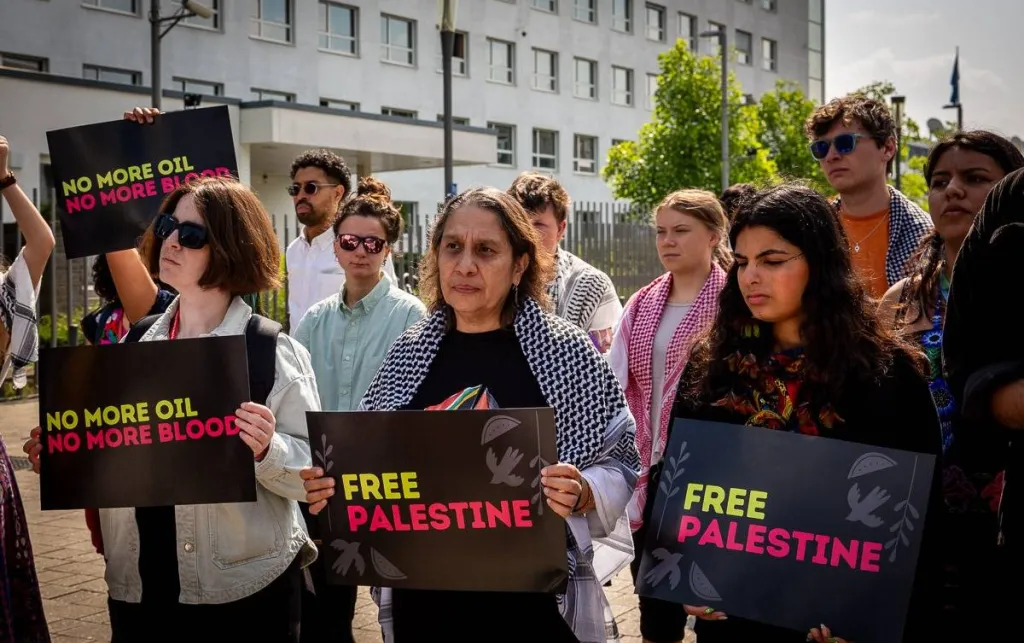
The challenges ahead
From the UNFCCC Bonn talks, to COP29 and beyond, making these arguments heard won’t be easy. Around the world, there have been crackdowns on protest and dissent, with reactionary politicians on the rise calling for clampdowns on legitimate peaceful protest. 20
In response, social justice movements are standing together more firmly than ever — connecting the dots between movements and issues. Connecting, for instance, Israel’s brutal occupation and repression of the Palestinian people, the military and technology companies profiting from Israel’s plausible genocide, and the impact this is having on the climate crisis through massive emissions, water and air pollution, and environmental devastation which will be felt for generations. 21
The demand for rich Global North countries to #PayUp for the climate crisis is therefore intimately connected to the fight for Palestinian justice, and to the wider need to overhaul our creaking anti-democratic systems of government.
Despite the challenges, we must remember that the road ahead requires bold action and unwavering commitment, but it is the only path towards true global justice and sustainability.
A Global Green New Deal (GGND) is necessary to envision real solutions, whilst avoiding past mistakes that perpetuate inequality. We must move away from false ‘solutions’ that squander precious time and resources, instead promoting just and equitable transitions to more sustainable economies and societies.
The fight for a GGND is not just about addressing the climate crisis, it's about dismantling the structures of exploitation and inequality that have brought us to this point.
By ensuring fair financial contributions from those most responsible and capable, we can build a future where everyone has the opportunity to live with dignity and in harmony with our planet.
Share this page
- 1
See analysis by Action Aid, Oxfam and others who show this money is available: https://actionaid.org/publications/2024/briefings-climate-justice-and-finan…
https://actionaid.org/publications/2024/fair-taxes-can-raise-over-us2-trill…
- 2
- 3
https://www.prospectmagazine.co.uk/world/foreign-correspondence/64646/in-th…
- 4
https://news.mongabay.com/2024/05/impunity-and-pollution-abound-in-drc-mini…
- 5
https://www.theguardian.com/world/2024/jan/09/emissions-gaza-israel-hamas-w…
- 6
https://forensic-architecture.org/investigation/ecocide-in-gaza
- 7
https://priceofoil.org/2024/03/14/new-research-exposes-countries-and-compan…
- 8
https://edition.cnn.com/2024/03/13/business/bp-abu-dhabi-newmed-energy/inde…
- 9
https://www.tni.org/files/2024-05/Climate%20Collateral%20-%202%20page%20rep…; https://data.worldbank.org/indicator/MS.MIL.XPND.CD?end=2022&locations=…
- 10
https://waronwant.org/resources/tax-and-climate-justice-redistributing-weal…
- 11
https://waronwant.org/resources/towards-trade-justice-changing-trade-just-a…
; and https://waronwant.org/news-analysis/just-transition-against-trade-rules-let…
- 12
https://www.carbonbrief.org/cop28-key-outcomes-agreed-at-the-un-climate-tal…
; https://www4.unfccc.int/sites/SubmissionsStaging/Documents/202402220839---F…
- 13
See this Carbon Brief analysis for detail of overall emissions imbalances https://www.carbonbrief.org/revealed-how-colonial-rule-radically-shifts-his…
See also: https://waronwant.org/news-analysis/call-climate-reparations
- 14
https://unfccc.int/sites/default/files/resource/54307_2%20-%20UNFCCC%20Firs…
- 15
- 16
- 17
https://waronwant.org/sites/default/files/TheNewColonialism.pdf
- 18
https://waronwant.org/resources/towards-trade-justice-changing-trade-just-a…
- 19
https://www.carbonbrief.org/revealed-how-colonial-rule-radically-shifts-his…; https://waronwant.org/sites/default/files/styles/primary_image_xsmall/publi…
- 20
https://drilled.media/news/gaza-standingrock-tigerswan?ref=drilled.ghost.io…
- 21
https://www.nytimes.com/2024/05/01/us/pro-palestinian-college-protests.html…; https://www.rosalux.de/en/news/id/51866/why-the-climate-justice-movement-ca… ; https://climatejustice.uk/coalition-statement-student-protests-palestine/…; https://forensic-architecture.org/investigation/ecocide-in-gaza
